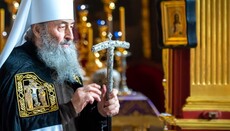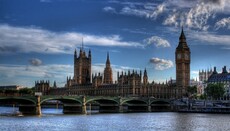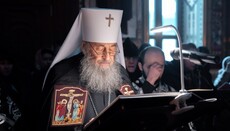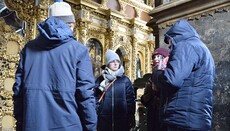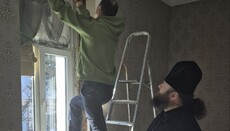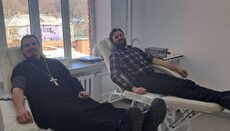UOC bishop: Why is the Church easy to persecute and impossible to destroy?
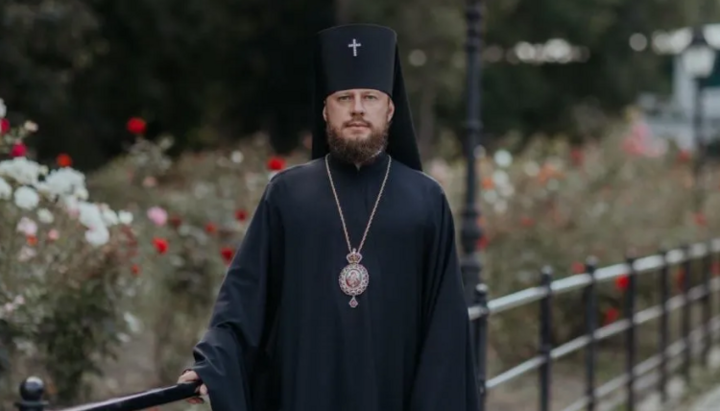
Vladyka Victor believes that people who want to "drive everyone into one structure and create a 'single' church do not understand the specifics of church life."
Archbishop Viсtor (Kotsaba) of Baryshivka told why the Church in Ukraine is easy to persecute, but impossible to destroy.
In an author’s column on the pages of the Politika publication, the UOC hierarch emphasized that “2022 turned out to be the most difficult and tragic year in the history of independent Ukraine,” but “it was particularly difficult for the believers of the Ukrainian Orthodox Church.”
Vladyka recalled that “during the war, more than a hundred churches and monasteries were damaged and completely destroyed, while priests bury their parishioners, relatives and sons almost every day.”
According to the hierarch, "the whole of Ukraine lives with the desire for victory, the desire to defend and uphold its independence and sovereignty." However, “in such a situation of nationwide unity, some forces inside the country decided to start work on settling scores with ‘opponents’, the bargaining chip being millions of believers of the Ukrainian Orthodox Church.”
“Over the past few weeks, a large-scale black PR campaign has been intensified against the Church, with clergy and believers harassed in the media and social networks, with anti-church bills submitted to the Verkhovna Rada, with the agreement to extend services in the Assumption Cathedral and the Refectory Church of Kyiv-Pechersk Lavra in 2023 terminated from January 1, 2023 <...> They seem to be trying to convince Ukrainian society that their enemy is not at the front, but in the rear,” writes Vladyka.
The Ukrainian Orthodox Church is millions of ordinary people, “not Russians, not FSB agents, not collaborators, but ordinary Ukrainians who were born and raised in Ukraine, who have families and children here.”
“When our country celebrated 2020, our President announced a special New Year greeting. Then we heard the words of a man who loves his people, all the citizens of Ukraine without exception, no matter how different they may be. Three years ago, Volodymyr Zelenskyy said that ‘learning to live in respect for each other should become our national idea for the sake of the future of our country.’ Then the President said that ‘it doesn’t matter for us which church Kadeniuk or Lobanovsky went to,’” the bishop recalled.
According to him, "that national idea, voiced by the President three years ago, cannot disappear because the war came to our homeland."
“Perhaps someone finds the idea of outlawing the Church very attractive, because believers are not radicals who can take up arms and go smash the buildings of the President's Office. <...> Then why is there such systemic pressure on peaceful and calm people who live by faith in God, who do not touch or offend anyone? Why are there calls for a ban on the Ukrainian Orthodox Church? Can this ban bring peace, tranquility and unity to Ukraine?” questions Archbishop Victor.
“The Church has existed for two thousand years despite the fact that it has been fought throughout its history. Until the 3rd century, pagan authorities simply killed Christians, often very brutally. In the 15th century, Muslims captured Constantinople and destroyed the Orthodox empire. Did it destroy the Church? No,” the bishop stressed.
He recalled that “in the 17th century on our land, the Zaporizhzhia Cossacks defended their faith from Catholicism, from attempts to eradicate Orthodoxy in it. Recently, the Bolsheviks unleashed unheard-of repressions against the Church: churches were destroyed, priests and believers were shot, sent to prisons, camps and exile,” but all this did not destroy the Church.
Vladyka believes that some people who want to "drive everyone into one structure and create a 'single' church do not understand the specifics of church life."
“If this can be done, then definitely not with the help of exclusively forceful methods. After a wave of church raids committed by the OCU in 2019, hundreds of communities that lost their temples only rallied and strengthened. Most of them were able to build new temples in a few years. The rest pray in private homes and even adjoining premises, slowly collecting funds for construction,” says Bishop Viktor.
He said that on December 31, 2022, thousands of believers gathered for the last Vespers of the year in the Refectory Church of the Kyiv-Pechersk Lavra.
On the eve it became known that the monastery was denied an extension of the contract for worship during 2023 in the Assumption Cathedral and the Refectory Church on the territory of the Upper Lavra.
Vladyka said the believers did not just pray as usual but sang Christmas carols and the troparion to the Resurrection “Christ is Risen from the Dead!”.
“This chant, affirming the victory of life over death, indicates that the ultimate fate of the individual and all mankind is in the hands of God. The Church bears witness to the Resurrection, and any oppression and persecution of the Church of Christ only strengthens this testimony,” the bishop is sure.
“There were different periods in the history of the Church. It existed and exists in different countries, in different cultures and civilizations. Its worship services are performed in different languages. The Church lived in the catacombs, and then rose from them and became the foundation of empires. There are many cases when its shepherds first served in gilded churches, but then ended up serving in sheds and dugouts. Moreover, some of them were martyred. This was only recently, at the beginning of the last century,” said Archbishop Victor.
He is sure that even when “our journey through life ends or someone 'helps' us end it, the Church will live forever.”
“In persecution or in prosperity, She will continue to live, because Christ said, “I will build My Church, and the gates of Hades will not prevail against it,” wrote the hierarch of the UOC.
Earlier, the UOJ wrote that, according to Archbishop Victor, neither the people nor the country needs the Church to be outlawed.
